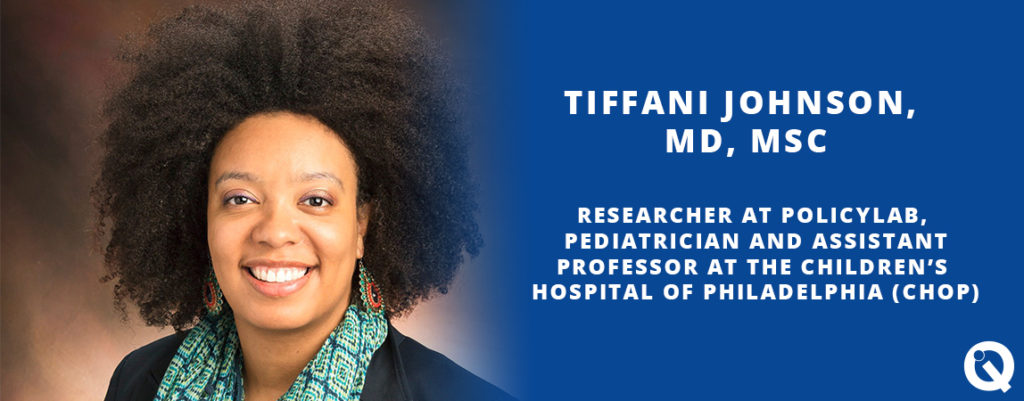Tiffani Johnson, MD, MSc, is a leading researcher of racial bias in health care. Dr. Johnson is a researcher at PolicyLab, a pediatrician and assistant professor at the Children’s Hospital of Philadelphia (CHOP). She will be our keynote speaker at the Quality Institute’s Spring All Council Conference on May 21. The topic is Racial Bias in Health Care: A Diagnosis and Treatment Plan.
First, can you tell us about your role at CHOP as both physician and researcher?
One of the things that I like about emergency medicine is that we provide access to all patients, regardless of their race, ethnicity, or education — and whether or not they have health insurance. I like the variety and fast-pace of the emergency department and the ability to intervene at what can be one of the scariest moments for children and parents. My research at PolicyLab is focused on racial and ethnic disparities in pediatric emergency care. I look to identify where there are potential differences in the quality of care that children receive…with the goal of developing and testing novel interventions aimed at reducing disparities.
What are the three insights or messages you want people who attend the conference to leave with?
First, we need to recognize the impact of race and racism on health. And also recognize and acknowledge current policies that exist that are barriers for our patients achieving their highest level of health and wellbeing. My second take-home message would be that in order to truly achieve equity, it’s important that organizations — whether health care organizations, insurers, or public health-related organizations — make equity a strategic priority. My third is that we all have certain biases that we bring to the table. And having bias doesn’t make you a horrible person. I hope to leave individuals with strategies to help them recognize their biases and to take steps at reducing the impact that their biases have on their decision-making.
What is your perspective on the lasting and persistent impact of racial bias in health care?
Racial bias has lasting impact in multiple ways. We have to take into consideration that our patients don’t live in the bubble of just the health care system. They experience racial bias when they go to school, for parents when they go to work, when they walk into stores. And they also experience racism in the health care system. We know that experiencing bias and discrimination, including unconscious bias, is a stressor that can have direct impacts on health. People who experience bias and discrimination are more likely to have high blood pressure, or problems regulating their blood sugar, or a weakened immune system. And this is something that impacts individuals from childhood across their entire life course. If we don’t address some of those issues the result is more health problems in adulthood — increased morbidity, increased mortality, and increased cost to the health care system.
But also, I’m thinking specifically, how does racism and unconscious bias impact us in the health care system? There is a robust body of literature that shows that unconscious bias impacts how healthcare providers communicate. They have more verbal dominance and less patient-centered communication. And even if the provider is unaware the patients pick up on it.
Finally, can you share a bit of your personal story, including your connection to New Jersey and what compelled you to study and practice medicine?
I am a Jersey girl. I’m originally from Montclair. When I was 10, my mom, who was a single parent raising my sister and me, got a job as the school board attorney for the Trenton public schools. She decided that if she was going to work for the district she wanted to put her kids in the district. For me, it was interesting going from the Montclair public schools, which were incredibly well resourced, to the Trenton public schools and seeing how you can live in the same state and have very different access to the resources that you need to get the highest quality education.
It was a risky move that my mother made, but I actually think that it made me a better human being. I have always worked in urban environments and I’m able to connect to my patients in a very different way because of the experiences that I had in my childhood. The move also informed the research that I’m doing. The inequalities within the education system helped me to think about inequalities in health care. I think it was something that really changed the trajectory of my life course and of my career.

